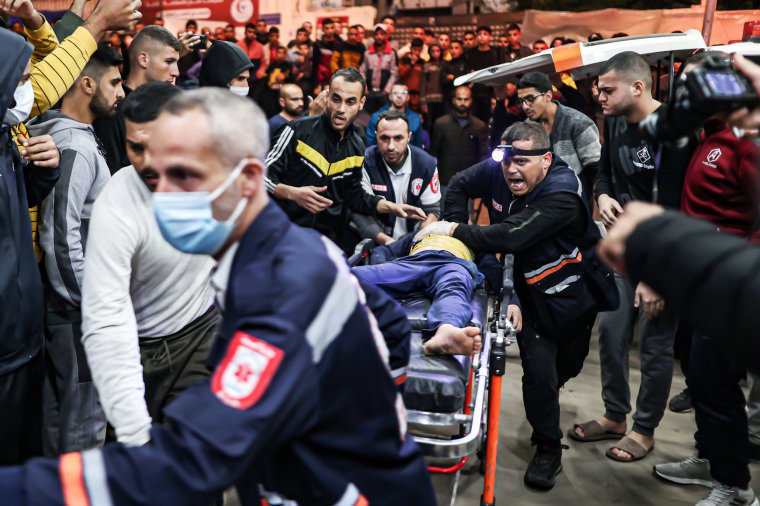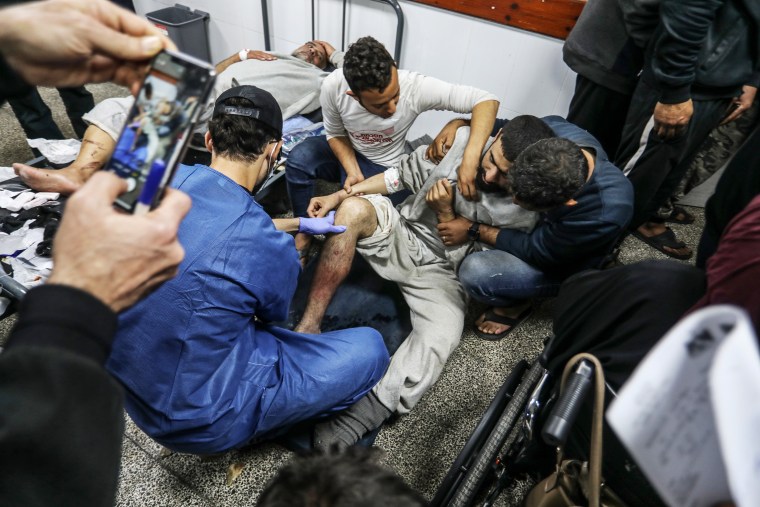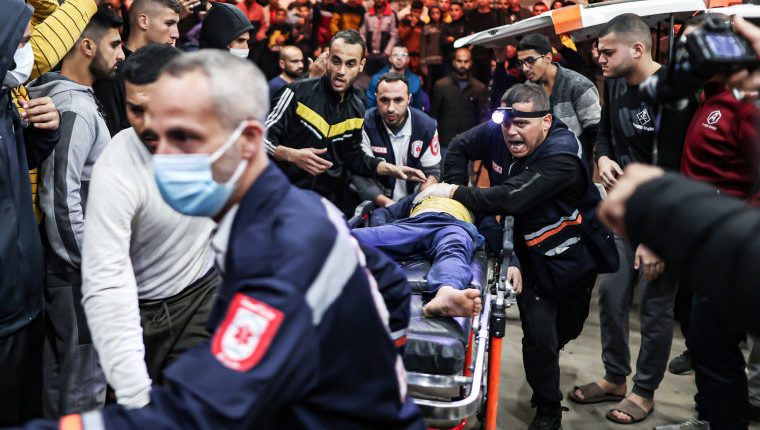After a 10-year-old girl was injured in a bombing in Rafah, she was brought to Dr. Nour El-Din Khaled Al-Amassi at Al-Najjar Hospital, bleeding from a head wound 4 inches deep, her pulse dropping rapidly.
In a functioning hospital, stabilizing her would have taken three minutes, Al-Amassi said. In Gaza, she died within 10 minutes.
Al-Amassi needed to maintain her pulse and administer intravenous solutions to prepare her for an operation. But there was no anesthesia, no adrenaline and no atropine to support her heart function.
He would have needed two more doctors, two nurses, an anaesthesiologist and a neurosurgeon, but the staff at his hospital, like others in Gaza, have fled — driven away by gunfire, airstrikes, collapsing buildings — and those who remain are stretched thin, struggling to care for the unceasing flow of wounded crowded onto the hospital’s floors and in its operating rooms.
The deprivations that prevented Al-Amassi from saving the girl cut across Gaza’s remaining hospitals. More than three months of relentless shelling and fighting has pushed Gaza’s hospitals to the brink of collapse, creating a spiraling crisis of preventable deaths and permanent injury that is piling tragedy on top of the war’s skyrocketing death toll, currently over 24,000, according to the Gaza Health Ministry.
Since the Oct. 7 surprise attack by Hamas, which killed roughly 1200 people in Israel and kidnapped about 240, hospitals have been at the center of Israel’s offensive in Gaza.

The Israel Defense Forces says Hamas operates command centers at hospitals, uses ambulances to transport fighters and diverts fuel aid intended for hospital use for military purposes, charges Hamas and hospital staff deny. The IDF found tunnels near or under hospitals, and a U.S. intelligence assessment found that Al-Shifa Hospital, which was at the center of intense fighting in November, was used to store some weaponry and house command infrastructure.
As of Thursday, Jan. 18, there have been 645 attacks on the health system of the Palestinian territories, including on hospitals, ambulances and vehicles delivering supplies, resulting in 619 deaths and 835 injuries, according to the World Health Organization.
And the attacks continue. On Wednesday, the area around Nasser hospital in Khan Younis came under bombardment, the sky flashing bright orange.
“The bombing was intense, something I had never witnessed before,” one man told an NBC News crew. “Everyone fled.”
Videos posted to social media that NBC News geolocated to Nasser appeared to show sounds of gunfire in the vicinity of the hospital, and chaos as people grabbed their belongings and evacuated.
As of this week, none of Gaza’s 36 hospitals are fully functional, according to the WHO. Only 15 remain open with severely limited services, and many of them are so overwhelmed with casualties that they are running at 200 percent capacity.
In a message sent to NBC on Jan. 4, James Smith, an emergency medical technician volunteering with the International Rescue Committee (IRC) and Medical Aid for Palestinians at Al-Aqsa hospital in central Gaza, described the aftermath as hostilities closed in on the hospital.
“Last night was horrific. Nurse this morning said they had 500 injured overnight. Am listening to the start of the night’s artillery fire and air strikes as I write. Three people died in resus this afternoon,” Smith said, referring to resuscitation.
“The system has fallen apart,” he said. “Not even the best triage system can withstand this. It’s constant.”
Significant obstructions to aid deliveries has meant critical shortages of pain relievers, antibiotics and anesthesia — basics for treating the injured.
“Every single square foot of ground is occupied by patients or their relatives,” Nick Maynard, a senior surgeon from Oxford University Hospital who is also volunteering with the IRC, said in an audio message from Al-Aqsa Hospital. “You walk into the hospital and see people outside with chest drains and with surgical drains and with nasty infected wounds.”

With few medical interventions available, doctors and health care workers described the wrenching pain of the severely injured and the grim regularity of watching patients die from often preventable deaths.
Al-Amassi, who is a physician for Project HOPE, a Washington-based aid organization, said that, at Al-Najjar Hospital, he is stitching up wounds with neither anesthesia nor narcotics.
“There are deep wounds that need daily dressing and multiple antibiotics of different types that are not available at all,” Al-Amassi said. Without those, even common injuries from a missile shrapnel can fester and turn into something much worse. In 4 to 7 days, he said, the limb may need to be amputated.
At Al-Shifa, Sean Casey, a coordinator for the WHO’s emergency medical team, said, “Patients were crying out in pain, but they were also crying out for us to give them water.”
“It’s pretty unbearable to see somebody with casts on multiple limbs, external fixator on multiple limbs, without drinking water and almost no IV fluids available,” he said. “Very few of those people would die if there was a functioning medical facility.”
Maynard, who spent two weeks at Al-Aqsa hospital this month, said that many trauma patients entered his operating room already malnourished from months of wartime food scarcity. An infection after surgery can tip them into rapid weight loss, “which can ultimately result in death,” Maynard told NBC News after his visit.
“It’s often, sadly, a very prolonged death. They don’t die quickly, and they can linger often for many days,” he said.
Source: | This article originally belongs to Nbcnews.com










